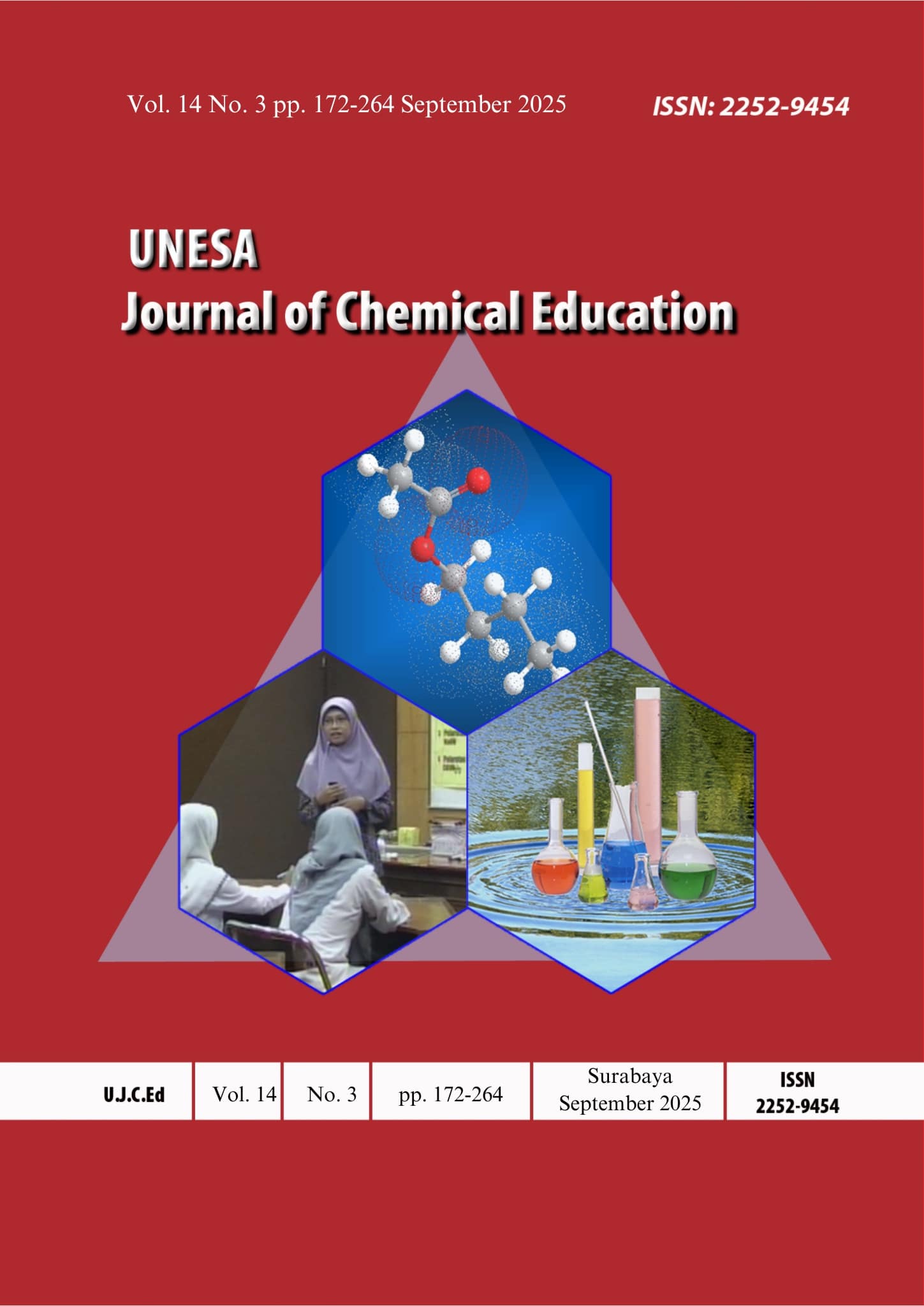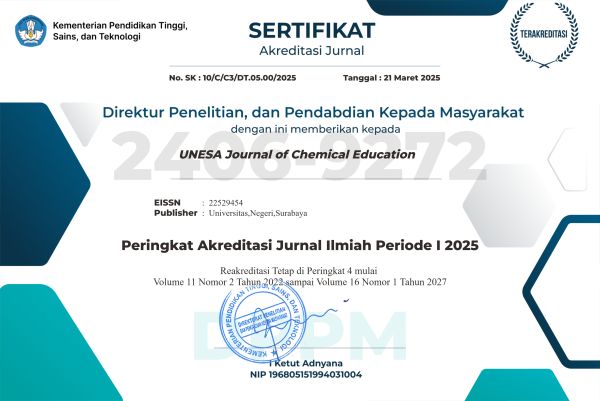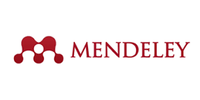MEASURING AND PROFILING STUDENTS' CRITICAL THINKING SKILLS ON CHEMICAL EQUILIBRIUM USING THE RASCH MODEL
DOI:
https://doi.org/10.26740/ujced.v14n3.p191-201Keywords:
Critical thinking skills, Rasch Model, chemical equilibriumAbstract
This research focused on measuring students' critical thinking skills in the topic of chemical equilibrium. The instrument used is an essay test consisting of 8 questions. Data collection took place from March to April 2024. The sample size was 80 students. Data were analyzed using the Rasch Model with Winsteps 5.6.0. The instrument underwent testing for unidimensional, validity (item fit), reliability, item difficulty level (item measure), and individual ability level (person measure). The analysis showed that the instrument had a person reliability of 0.64 and item reliability of 0.96. The interaction between person and items is displayed on the Wright Map and Scalogram. The analysis of person and items provided significant information about the participants' abilities and the difficulty levels of the tested questions. A total of 4 respondents were identified as misfit according to the model. The identification of person misfit also plays a role in understanding patterns of responses that do not align with the model. The findings of this study can serve as a reflection for both students and lecturers regarding students' critical thinking skills.
Downloads
References
Ad’hiya, E., and Laksono, E. W. 2021. Students’ Analytical Thinking Skills and Chemical Literacy Concerning Chemical Equilibrium. AIP Conference Proceedings, pp. 1–4.
Atkins, P., and Paula, J. D. 2015. Elements of Physical Chemistry. India: Oxford University Press.
Banta, T. W., and Palomba, C. A. 2014. Assessment Essentials: Planning, Implementing, and Improving Assessment in Higher Education. United States of America: John Wiley & Sons.
Blackie, M. A. L. 2022. Knowledge Building in Chemistry Education. Foundations of Chemistry, Vol. 24, No. 1, pp. 97–111.
Bond, T. G., and Fox, C. M. 2013. Applying the Rasch Model: Fundamental Measurement in the Human Sciences. London: Psychology Press.
Boone, W. J., Staver, J. R. and Yale, M. S. 2013. Rasch Analysis in the Human Sciences. Berlin: Springer.
Cohen, L., Manion, L., and Morrison, K. 2002. Research Methods in Education. Britania Raya: Routledge.
Cooper, M. M., and Stowe, R. L. 2018. Chemistry Education Research - from Personal Empiricism to Evidence, Theory, and Informed Practice. Chemical Reviews, Vol. 118, No. 12, pp. 6053–6087.
Danczak, S. M., Thompson, C. D., and Overton, T. L. 2017. What Does the Term Critical Thinking Mean to You?’A Qualitative Analysis of Chemistry Undergraduate, Teaching Staff and Employers’ Views of Critical Thinking. Chemistry Education Research and Practice, Royal Society of Chemistry, Vol. 18, No. 3, pp. 420–434.
Danili, E., and Reid, N. 2004. Some Strategies to Improve Performance in School Chemistry, Based on Two Cognitive Factors. Research in Science & Technological Education, Vol. 22, No. 2, pp. 203–226.
Eales-Reynolds, L. J., Jones, P., McCreery, E., and Judge, B. 2013. Critical Thinking Skills for Education Students. England, United Kingdom: Learning Matters.
Edwards, A., and Alcock, L. 2010. Using Rasch Analysis to Identify Uncharacteristic Responses to Undergraduate Assessments. Teaching Mathematics and Its Applications: An International Journal of the IMA, Vol. 29, No. 4, pp. 165–175.
Freire, M., Talanquer, V., and Amaral, E. 2019. Conceptual Profile of Chemistry: A Framework for Enriching Thinking and Action in Chemistry Education. International Journal of Science Education, Vol. 41, No. 5, pp. 674–692.
Hagos, T., and Andargie, D. 2023. Effects of Technology-Integrated Formative Assessment on Students’ Conceptual and Procedural Knowledge in Chemical Equilibrium. Journal of Education and Learning (EduLearn), Vol. 17, No. 1, pp. 113–126.
Harrison, A. G., and De Jong, O. 2005. Exploring The Use of Multiple Analogical Models When Teaching and Learning Chemical Equilibrium. Journal of Research in Science Teaching: The Official Journal of the National Association for Research in Science Teaching, Vol. 42, No. 10, pp. 1135–1159.
Jacob, C. 2004. Critical Thinking in The Chemistry Classroom and Beyond. Journal of Chemical Education, Vol. 81, No. 8, pp. 1216.
Linacre, J. M. 2006. A user’s Guide to WINSTEPS MINISTEP: Rasch-model Computer Programs. https://archive.org/details/B-001-003-730/page/n2/mode/1up. Accessed February 7, 2025.
Liu, O. L., Frankel, L., and Roohr, K. C. 2014. Assessing Critical Thinking in Higher Education: Current State and Directions for Next‐Generation Assessment. ETS Research Report Series, No. 1, pp. 1–23.
Martone, A., and Sireci, S. G. 2009. Evaluating Alignment between Curriculum, Assessment, and Instruction. Review of Educational Research, Vol. 79, No. 4, pp. 1332–1361.
McPeck, J. E. 2016. Critical Thinking and Education. Britania Raya: Routledge.
Meilia, M., and Murdiana, M. 2019. Pendidik Harus Melek Kompetensi dalam Menghadapi Pendidikan Abad Ke-21. Al Amin: Jurnal Kajian Ilmu Dan Budaya Islam, Vol. 2, No. 1, pp. 88–104.
Muchtar, Z., Sutiani, A., Dibyantini, R. E., and Sinaga, M. 2023. Pengembangan Instrumen Evaluasi untuk Mengukur Keterampilan Berpikir Tingkat Tinggi pada Materi Kesetimbangan Kimia. JIIP-Jurnal Ilmiah Ilmu Pendidikan, Vol. 6, No. 7, pp. 4834–4842.
Muhsin, L. B., and Laksono, E. W. 2023. Development of Integrated Assessment to Measure Studentâ€TMs Analytical Thinking Skills and Scientific Attitudes for Chemical Equilibrium Topic. Jurnal Penelitian Pendidikan IPA, Vol. 9, No. 2, pp. 556–562.
Nadia, F. I., and Laksono, E. W. 2021. Investigating Students’critical Thinking Skill in Chemical Equilibrium Using The Discovery Learning. Jurnal Kependidikan Penelitian Inovasi Pembelajaran, Vol. 5, No. 1, pp. 45–59.
Paiva, J. C. M., and Gil, V. M. S. 2000. The Complexity of Teaching and Learning Chemical Equilibrium. Journal of Chemical Education, Vol. 77, No. 12, pp. 1560.
Permatasari, M. B., Muchson, M., Hakimah, N., Rokhim, D.A., Herunata, H., and Yahmin, M. 2022. Identifikasi Miskonsepsi Materi Kesetimbangan Kimia pada Siswa SMA Menggunakan Tes Three Tier Berbasis Web. Jurnal Inovasi Pendidikan Kimia, Vol. 16, No. 1, pp. 1–7.
Pithers, R. T., and Soden, R. 2000. Critical Thinking in Education: A Review. Educational Research, Vol. 42, No. 3, pp. 237–249.
Qing, Z., Jing, G., and Yan, W. 2010. Promoting Preservice Teachers’ Critical Thinking Skills by Inquiry-Based Chemical Experiment. Procedia-Social and Behavioral Sciences, Vol. 2, No. 2, pp. 4597–4603.
Rahmawati, Y., Ridwan, A., Hadinugrahaningsih, T., and Soeprijanto. 2019. Developing Critical and Creative Thinking Skills Through STEAM Integration in Chemistry Learning. Journal of Physics: Conference Series, Vol. 1156, pp. 1–7.
Rushiana, R. A., Sumarna, O., and Anwar, S. 2023. Efforts to Develop Students’ Critical Thinking Skills in Chemistry Learning: Systematic Literature Review. Jurnal Penelitian Pendidikan IPA, Vol. 9, No. 3, pp. 1425–1435.
Silaj, K. M., Schwartz, S. T., Siegel, A. L. M., and Castel, A. D. 2021. Test Anxiety and Metacognitive Performance in The Classroom. Educational Psychology Review, Vol. 33, No. 4, pp. 1809–1834.
Sumintono, B., and Widhiarso, W. 2015. Aplikasi Pemodelan Rasch Pada Asesmen Pendidikan. Bandung: Trim Komunikata.
Teichert, M. A., Tien, L. T., Dysleski, L., and Rickey, D. 2017. Thinking Processes Associated with Undergraduate Chemistry Students’ Success at Applying A Molecular-Level Model in A New Context. Journal of Chemical Education, Vol. 94, No. 9, pp. 1195–1208.
Thornhill-Miller, B., Camarda, A., Mercier, M., Burkhardt, J.-M., Morisseau, T., Bourgeois-Bougrine, S., Vinchon, F., Hayek, S. E., Augereau-Landais, M., Mourey, F., Feybesse, C., Sundquist, D., and Lubart, T. 2023. Creativity, Critical Thinking, Communication, and Collaboration: Assessment, Certification, and Promotion of 21st Century Skills for the Future of Work and Education. Journal of Intelligence, Vol. 11, No. 3, pp. 1–32.
Wibisono, S. 2016. Aplikasi Model Rasch untuk Validasi Instrumen Pengukuran Fundamentalisme Agama Bagi Responden Muslim. Jurnal Pengukuran Psikologi Dan Pendidikan Indonesia, Vol. 5, No. 1, pp. 1–29.
Wright, B. D. 1979. Best Test Design. Chicago: MESA press.
Zhou, Q., Huang, Q., and Tian, H. 2013. Developing Students’ Critical Thinking Skills by Task-Based Learning in Chemistry Experiment Teaching. Creative Education, Vol. 4, No. 12A, pp. 40–45.
Downloads
Published
Issue
Section
License
Copyright (c) 2025 UNESA Journal of Chemical Education

This work is licensed under a Creative Commons Attribution-NonCommercial 4.0 International License.
The license terms of the Creative Commons Attribution-NonCommercial 4.0 International (CC BY-NC 4.0) requires attribution to the original creator, permits non-commercial use, and does not allow for the application of legal or technological restrictions on others' use.
 Abstract views: 41
,
Abstract views: 41
, PDF Downloads: 55
PDF Downloads: 55













